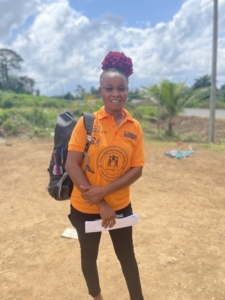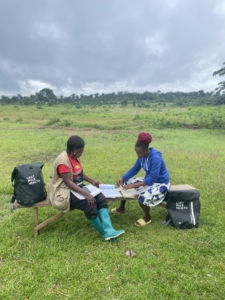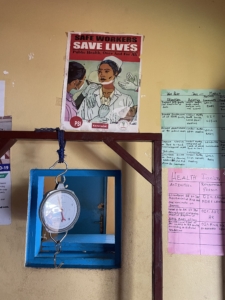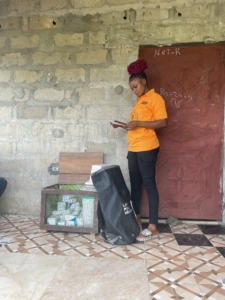Victoria Karpay remembers the first time she met a community health worker. “I went to visit one of my friends in her community,” she recalls. “People were coming up to her, asking for health advice.’” Curious, Victoria asked her friend how she had received training, and her friend told her about Liberia’s National Community Health Program. After she passed a recruitment test, she completed training from the Ministry of Health and an NGO called Last Mile Health, her friend explained, and now she provided primary healthcare to her neighbors.
An inquisitive learner with a deep commitment to her lifelong community of Taye Town in Grand Bassa County, Victoria was captivated. “I started talking to myself, thinking, ‘Will the program come to my community? If so, I want to be recruited.’”
As the National Community Health Program scaled across Liberia, it soon reached Taye Town—and Victoria passed the recruitment test and completed her training. “Before I became a community health worker, there was no healthcare in the community. We would have to go to Buchanan,” she explains, referring to the nearest city. “But to get a motorbike or a car would be very hard. So a person could die.”
Today, Victoria delivers care in Taye Town and three neighboring communities, a role she has held for three years. She receives training, supplies, and a regular salary through Last Mile Health and the Ministry of Health, and she has regular visits with her supervisor, Martina Kanneh. Each day, Victoria visits three or four households in her catchment area, treating sick children, counseling mothers and pregnant women, and providing health education. She balances her work with caring for her two children, seeing them off to school before packing her own backpack to conduct home visits, and preparing food for her family as soon as she arrives home. And at any hour, the community relies on her, asking her for advice on health issues when they see her walking from house to house, or seeking her at home when their children are sick.
“In Taye Town, our main disease is malaria,” Victoria says. “Before, we never understood how the disease comes into the community. We never knew the signs and symptoms. In my training, I learned the danger signs, and I have educated my community. They know that if any of these signs happen in the child, they should come to me right away.”
She remembers one such case. “One time I was at my house here when a lady came from my community,” she says. “Her child’s skin was burning and she was crying, ‘Oh, my baby, something has happened to my baby!’” Victoria calmed the anxious mother and asked about her son’s symptoms. Recognizing warning signs for malaria, she conducted a rapid diagnostic test. “It was positive, which means the child has malaria,” Victoria explains. “With a positive result, we are supposed to begin the treatment right away, so I gave the first dose and told the mother to wait a while. After 30 or 40 minutes, his skin had cooled. I escorted them to the house and set the follow-up appointment.” She smiles. “When I came back, the child was playing and hugging me.”
Victoria can see the impact healthcare access has had in Taye Town. “Since we now have a community health worker, things are different. We are counting down to zero outbreaks, zero child deaths, and zero maternal deaths,” she says. She feels satisfaction in the respect and trust she’s earned—and the outcome of the care she provides. “Even on the most challenging days, I can give a treatment, and it will have a result. If they don’t improve, I will refer them to the hospital. I will treat two or three sick children every month, and see them respond and get well.”
Her work has saved lives. “Since I started working as a community health worker, there have been no child deaths or maternal deaths in my community,” she says.
Victoria’s life has changed, too. “Now in Taye Town, they see me as a leader. This makes me feel proud,” she shares. “When there are community meetings they call for me to attend to advise on health matters. This community health program has showed me that I can achieve more. I want to become a nurse,” she says. She has goals for Taye Town, too: “I want my community to be a health-seeking community.”
She wants health leaders and donors to understand the importance of community health workers. “We are the middleman between the community and the health facility. We give our health education on various diseases, immunization. I encourage pregnant women to go to the facility for delivery and to make sure their children get their vaccines. We see that our people in the community seek health, and that they are taken care of.” Her call to action is clear: “Community health workers need more supplies and more investment. It’s important that we have supplies at all times, so when people come for help, we have the medicines we need to treat them, and they will trust in us and come back whenever they are sick.”
Reflecting on what she has helped her community achieve, Victoria says, “I feel great to be a lifeline for my community people. We used to feel some problems in the community, but with the help of this program, my community has been uplifted.”








